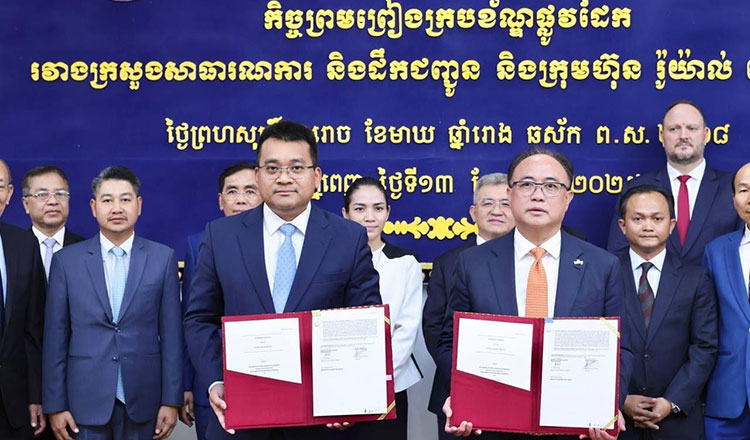Government, Royal Railway ink agreement to enhance railway infrastructure
The government, represented by the Ministry of Public Works and Transport (MPWT), and the Royal Railway Company Limited signed a ‘’Framework Agreement on the Railway Project’’ on Thursday. The agreement aims to enhance Cambodia’s railway infrastructure, making it more sustainable, resilient, and inclusive.
The signing ceremony was presided over by Peng Ponea, Minister of Public Works and Transport, and attended by Oknha Kith Meng, Chairman of the Board of Directors of Royal Railway Company Limited, alongside leaders and members of the Inter-Ministerial Committee for Negotiating the Railway Concession Agreement.
Speaking at the event, Ponea emphasised that this agreement marks a significant step towards establishing a new Public-Private Partnership (PPP) under the Build-Operate-Transfer (BOT) model, following the high-level directive of Prime Minister Hun Manet.
The minister further explained that the framework agreement aligns with the principles of the premier, issued on January 31, 2025, which set out the following authorisation principles:
Firstly, to establish a Framework Agreement (FA) as the basis for negotiations on a new Public-Private Partnership (PPP) contract under the Build-Operate-Transfer (BOT) model, replacing the current Landlord contract model. This new framework will facilitate government participation and engagement with experienced strategic partners in the railway sector.
Secondly, to ensure the sustainability of railway operations without disruption during the negotiations by allowing Royal Railways to continue operating in the interim period until the negotiations are concluded.
Thirdly, once a new strategic partner is selected, the government, Royal Railway, and the new partner will establish a Joint Venture (JV) company to negotiate the next steps towards a new concession agreement under the PPP format.
Fourthly, to conduct a full audit of Royal Railway, including an asset audit, operational audit, financial audit, and other necessary assessments to ensure transparency and accountability.
Minister Ponea also highlighted the Comprehensive Master Plan on the Intermodal Transport and Logistics System of Cambodia 2023-2033, which projects that rail passenger traffic will reach approximately 1.5 million passengers per year, while freight transport is expected to handle around 8 million tonnes annually. These projections account for the planned Phnom Penh-Bavet railway line, set for development by 2030.
Furthermore, by 2030, major transport hubs such as Phnom Penh, Preah Sihanouk, Siem Reap, Battambang, Bavet, and Poipet are expected to experience significant traffic flows across multiple transport modes, including road, rail, river, sea, and air.
Based on the current demand for transport and logistics infrastructure, the vision of the master plan is to develop an advanced, interconnected intermodal transport system, improving both physical and digital infrastructure to drive economic growth and support Cambodia’s sustainable and inclusive development.
The minister underscored the crucial role of land transport, particularly railways, in national development. He emphasised that the signing of this framework agreement represents a major milestone for Cambodia’s railway sector and reflects the government’s commitment to modernising railway transport and logistics.
On this occasion, Minister Peng Purna also directed the Inter-Ministerial Committee for Negotiating the Railway Concession Agreement and Royal Railway Company to continue their strong collaboration in finalising the new public-private partnership agreement. He further urged them to identify strategic partners with expertise, knowledge, and experience in railway development to ensure a more efficient and advanced railway system in line with the government’s long-term vision.
Source : Khmer Times

